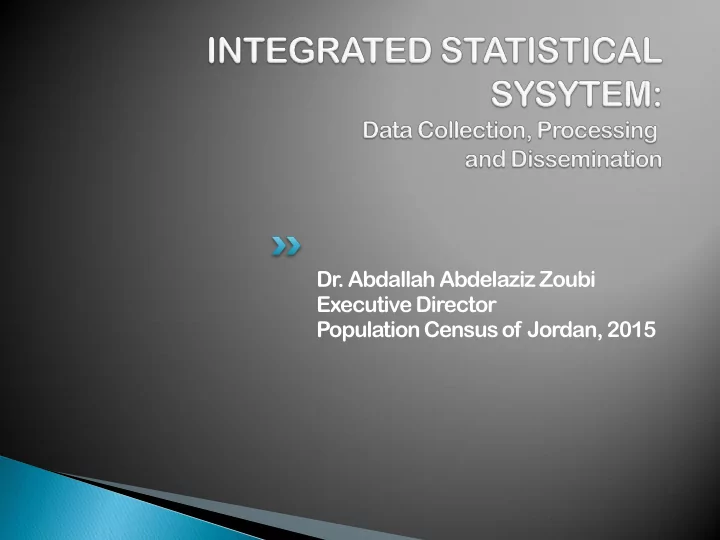

Dr . Abdallah Abdelaziz Zoubi Executive Director Population Census of Jordan, 2015
Timely, accurate and adequate response to data needs in support of policy works and decision making
Gathering harmonized and internationally comparable data to support: Availability of timely , accurate statistical information enables countries to address a wide range of issues in today’s rapidly - evolving global economic and social landscape Improve the efficiency of data and metadata collection, validation, processing, storage and dissemination; Improve quality , eliminating errors and incoherencies and shortening statistical publication cycles , and enhance the accessibility and visibility of the Organization's statistical outputs .
The overall architecture of the Statistical System consists of three layers : Production layer : collection, validation, processing and management of statistical data and metadata Storage layer : validated statistics and related metadata are stored dissemination layer : for producing statistical publications and online/offline interactive statistical products The three layers (or pillars in the architecture modular) supported by a workflow system which automates statistical and publication processes wherever possible, and tracks the steps involved.
Data Sources: Censuses Sample surveys & Specialized Studies Administrative records from Line ministries Processes: Design and testing Data collection Processing and analysis Dissemination Monitoring & Evaluation
Process based approach Interoperable User Centric Sustainable Flexible Collaborative Reusability Central repository: (include all standalone databases) Modalities of publication; online External accessibility/ linking other government bodies
Team mobilization Review & Define Evaluation process Implementatio Define n requirements Implementation System Design & Development Development Activities:- Stakeholder Vendor activities testing Benefit Data realization migration Train IT and Managers
Provisional Final Vendor Testing Acceptance Acceptance Testing Testing Testing by Testing by DOSM, Testing Issues DOSM & Test Production Environment Environment & Simulate 2 sites. Function Module Integration Exception Security Business Scenario Usability Performance Backup & Restore Failover Load Balancing Installation
Required data Sources of data Approach for System Design converting data Completed Schedule Resources 1. Develop Data migration Plan 2. Develop migration 3. Collect Data tools and procedures 5. Convert Received 4.Migration and migrate in Data test run data Center
Management Technical team User Group Team Tool development • Application • Application • software software Software • requirement Equipment • Application • Software
Subject Matter Business and Technical Architect • System Integration Expertise • Implementation Expertise • Experts Active participation during discussions • Identify Issues and Requirements • Timeliness of Respond • Decision Making •
More Effective Monitoring of the Census/Survey 1. Efficiency of Census/ Survey Processes 2. Centralized Integrated Statistical System 3. Extend Dissemination of Statistical Information 4. Data Visualization 5. Knowledge Sharing 6. Addressing CHALLENGES 7.
Complete information on the Census / Survey Pro-active Monitoring mechanism. Number of Sample Case assigned to each officer
Reduce the number of processes Edit Spec Validation Census/Survey Data available for review after each submit the batch for validation. Automate Manual Processes. Automate Manual Processes Report Preparation
flexibility to transfer data between disparate Systems Data Consistency and Up – To- Date Data at “finger tips”
Ext xtend Dissemination of f Statistical In Information Mechanism for publishing Census/ Survey Reports on website Dissemination of Data Requests Dissemination of Customized Census/ Survey Reports Feedback from the “Customer” Customer Service
Analyzing information using Maps (Geospatial Database) Performance Management System Business Intelligence.
Turning personal knowledge into corporate knowledge that can be shared throughout the organization Platform for collaboration, sharing and disseminating knowledge throughout the organization Knowledge Repository.
Data migration to central repository; Knowledge gap related to complicated statistical analysis Timeline is usually a challenge Time needed to have new system architecture and system development tools and training and migrating to the new system
So Some me Fe Features atures of of th the e Jordan Jo rdan Po Population pulation Cen Census, sus, 20 2015 15
Technical designs and testing Training Human resources & modalities of work
Geo-coding System of cities, villages, cams and admin affiliations Office demarcation of digital maps Field digital demarcation & clearing/adoption Listing of Buildings, Housing units and households with GPS9 (eligibility for enumeration) Data transition cycles/ data migration to the center Quality assurance, (role of call center) Management of operations
Needs ds and m d mobilizatio ization n of human n resource rces Tr Training ng, taski king ng and de d deploym yment ent Mo Monitor toring ing perf rform ormance ance Analysis, ysis, produ duction ction of proce cess ss indi dicato cators, s, and p d progress ress indi dicato cators Work k flow line ne in n sup upport of qua uality assur urance
Three cycles of data transition Transfer of demarcation data, starting with office demarcation of digital maps, ending with field demarcation and accreditation Listing transfer, starting with listing BLGs, HU & HHs in handed demarcated areas, accreditation and storing Enumeration data transfer, including visiting and interviewing HHs Storage and security of data
In electronic solutions I particular, processing of data is continuous throughout all stages including the enumeration In addition, electronic processing for Consistency, completeness and range check During preparation of tables During analysis and evaluation
Set ets of indicators: Preliminary indicators Main indicators Detailed indicators Census tabulation plan Census reports
Recommend
More recommend